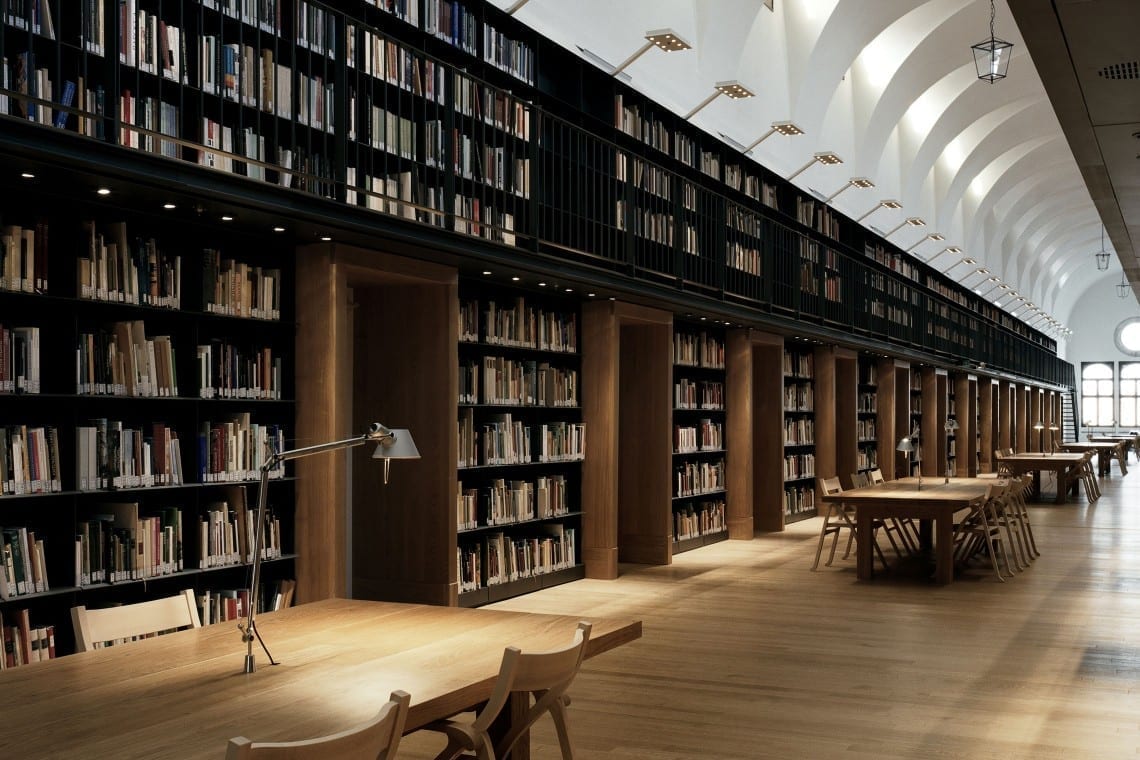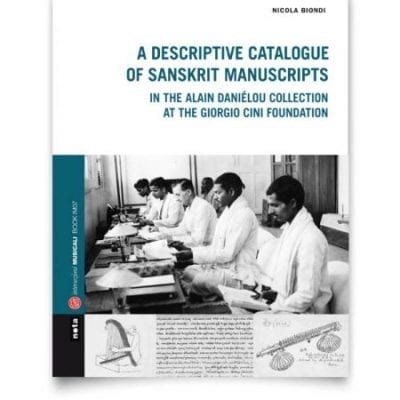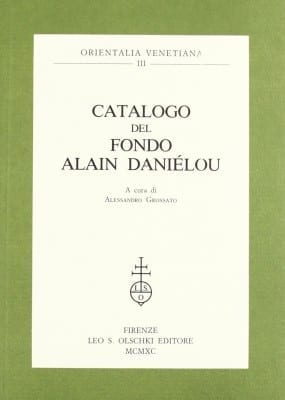
The Cini Foundation and the Institute for Comparative Musicological Studies are located in Venice on the Island of San Giorgio Maggiore. The Institute and the Foundation are two different entities housed by the same building. The Daniélou Archive comprises heterogeneous material divided between the two institutions. The Cini Foundation (the Venice Oriental Library) consists of departments organized by subject, plus what is known as the «Alain Daniélou Library». This library comprises four major sources included in Daniélou’s donation to the Foundation dated 19 August 1971. The room dedicated to Alain Daniélou is organised according to the terms of his bequest.
The classification system includes twelve sections: Puranas, Architecture, History of Eastern Religions, Music, Music of India, Indian Civilisation, Western Religions: Christianity and Druidism, the Archives of the Institute, Indian Manuscripts, Magazines (Vol d’Isis, Traditional Studies), Asiatic Civilisations (China, Buddhism, etc.), Journals: Ecole française d’extrême orient, École pratique des hautes études. In short, the archive comprises four major types of document: personal works by Daniélou, very heterogeneous in the quality of the editions, titles, the periods of the authors, the subjects dealt with. The second category consists of 300,000 micro-index cards (half Bristol cards) concerning Daniélou’s musical research in India and after his return to Europe (the Berlin and Venice Institutes). The third part of the archives includes manuscripts from his work in Indian libraries: mainly Adyar and Pondicherry. The fourth section also consists of manuscripts from his work in Indian libraries: mainly Benares, Madras and Pondicherry. Alain Daniélou was, together with Omkarnath Thakur, put in charge of the College of Music at the Benares Hindu University (BHU) in 1945. In 1953-1954, he became Director of the Adyar Manuscript Library at Madras (the Adyar Library of the Theosophical Society), where he stayed two years. At the same time, he started collaborating with the École française d’Extrême-Orient at Pondicherry, at the Sanskrit Study Centre. The Pondicherry establishment was opened in 1955 for research on Shaivite literature and the history of art of southern India. Jean Filliozat was its director from 1956 to 1977 and, with Daniélou’s assistance, organised a vast project for the collection of Shaivite manuscripts and a photo library.
It should be noted that all these archives are not accessible to the public, since some of the documents are fragile and means of preserving them are still being studied. Furthermore, not all of them are even classified. We should also note that the Cini Foundation has completed the archive with the purpose of coherence, so that if, by way of example, Alain Daniélou had two volumes of a trilogy, they have purchased the third. In the same way, the Cini Foundation is completing the archive with later works relating to the music of India.
The index cards is the result of decades of Daniélou’s life to this project, aided by pundits, as well as by Indian and Western assistants of varying qualifications and meticulousness. The microfilms cover very different directions and are of varying importance. Some only provide indications, while others are full of information; some are of an anecdotal nature, while others – according to specialists – are of capital importance. The information indicated in this richly detailed arborisation can be classified in five categories: Authors; Musicians; Terminology; Works; Instruments. It should be noted that the current classification is not Daniélou’s. It reflects the fact that this archive has been handled by various persons, without any real coordination, in the sense that no one actually knew what should be done with it.
Furthermore, there still some unclassified archives. According to Nicola Biondi, a researcher in Indian music (with a doctorate in Sanskrit), who studied this archive as part of a six-month assignment at the Cini Foundation, the Daniélou archive covers about 60 to 65 % of the archive itself. The unclassified archives comprise various kinds of document: manuscripts, typescripts, various versions of the same work, as well as whole works translated from Sanskrit into English that have never been published. These archives comprise (mainly Sanskrit) manuscripts of ancient Hindu documents. They also include the Institute archives: 1968-9: round tables, reports on activities in Berlin and mention of setting up of a partnership with the Cini Foundation and a branch of the Berlin Institute in Venice (1966).
In 1990, the Italian publishing house Olschki (Florence) published Catalogo del fondo Alain Daniélou, Orientalia Venetiana III, edited by Alessandro Grossato. The book consists of an introduction, a history of Daniélou’s Library, a complete bibliography of Alain Daniélou and the introduction to the catalogue.
Last but not the least, in regards to the Institute for Comparative Music Studies, here we have records (discs) from the various UNESCO collections (EMI, Bärereiter, Phillips). It appears that some of the Berlin archives were transferred to the Cini Foundation on Alain Daniélou’s arrival.
A Descriptive Catalogue of Sanskrit Manuscripts in Alain Daniélou’s Collection at the Giorgio Cini Foundation
 Published in the series “Intersezioni Musicali”, promoted by the Intercultural Institute for Comparative Music Studies in collaboration with the publishers Nota (Udine), this catalogue is the initial result of the long, meticulous task of re-ordering and analysing the Daniélou Archive. The work has involved digitising the manuscripts, cataloguing the books and making a new complete inventory of the Archive. The collection of over 200 manuscripts, mainly written in Sanskrit, consists of musicological treatises from the Indian subcontinent (Sańgīta-śāstra) and, more generally studies on sound, also from a philosophical and religious perspective. There is an also important section of treatises on dance, an art intimately bound to music in Indian culture. The catalogue was created to meet the need to make the archive donated by Alain Daniélou to the Fondazione Cini more visible and easier to consult for the scholarly community. It was Daniélou himself who gathered and commissioned the copying of these manuscripts during his years spent in India. The project that he and his Indian collaborators began in the 1940s for the Music College at the Banaras Hindu University involved the painstaking study and exegesis of the texts, left incomplete, however. The publication of the catalogue is thus also meant to encourage the continuation of this work, by enabling researchers to explore the content of the Archive and study the Indian sources preserved in the Foundation. The particular merit of the collection not only concerns the originality of the materials (copies rewritten by hand or typed, and in some cases no longer found even in India) but also the internal logic of the entire collection, which reflects Daniélou’s musical, but also philosophical and religious interests.
Published in the series “Intersezioni Musicali”, promoted by the Intercultural Institute for Comparative Music Studies in collaboration with the publishers Nota (Udine), this catalogue is the initial result of the long, meticulous task of re-ordering and analysing the Daniélou Archive. The work has involved digitising the manuscripts, cataloguing the books and making a new complete inventory of the Archive. The collection of over 200 manuscripts, mainly written in Sanskrit, consists of musicological treatises from the Indian subcontinent (Sańgīta-śāstra) and, more generally studies on sound, also from a philosophical and religious perspective. There is an also important section of treatises on dance, an art intimately bound to music in Indian culture. The catalogue was created to meet the need to make the archive donated by Alain Daniélou to the Fondazione Cini more visible and easier to consult for the scholarly community. It was Daniélou himself who gathered and commissioned the copying of these manuscripts during his years spent in India. The project that he and his Indian collaborators began in the 1940s for the Music College at the Banaras Hindu University involved the painstaking study and exegesis of the texts, left incomplete, however. The publication of the catalogue is thus also meant to encourage the continuation of this work, by enabling researchers to explore the content of the Archive and study the Indian sources preserved in the Foundation. The particular merit of the collection not only concerns the originality of the materials (copies rewritten by hand or typed, and in some cases no longer found even in India) but also the internal logic of the entire collection, which reflects Daniélou’s musical, but also philosophical and religious interests.
Edited by Nicola Biondi
Edizioni Nota, Udine, 2017


